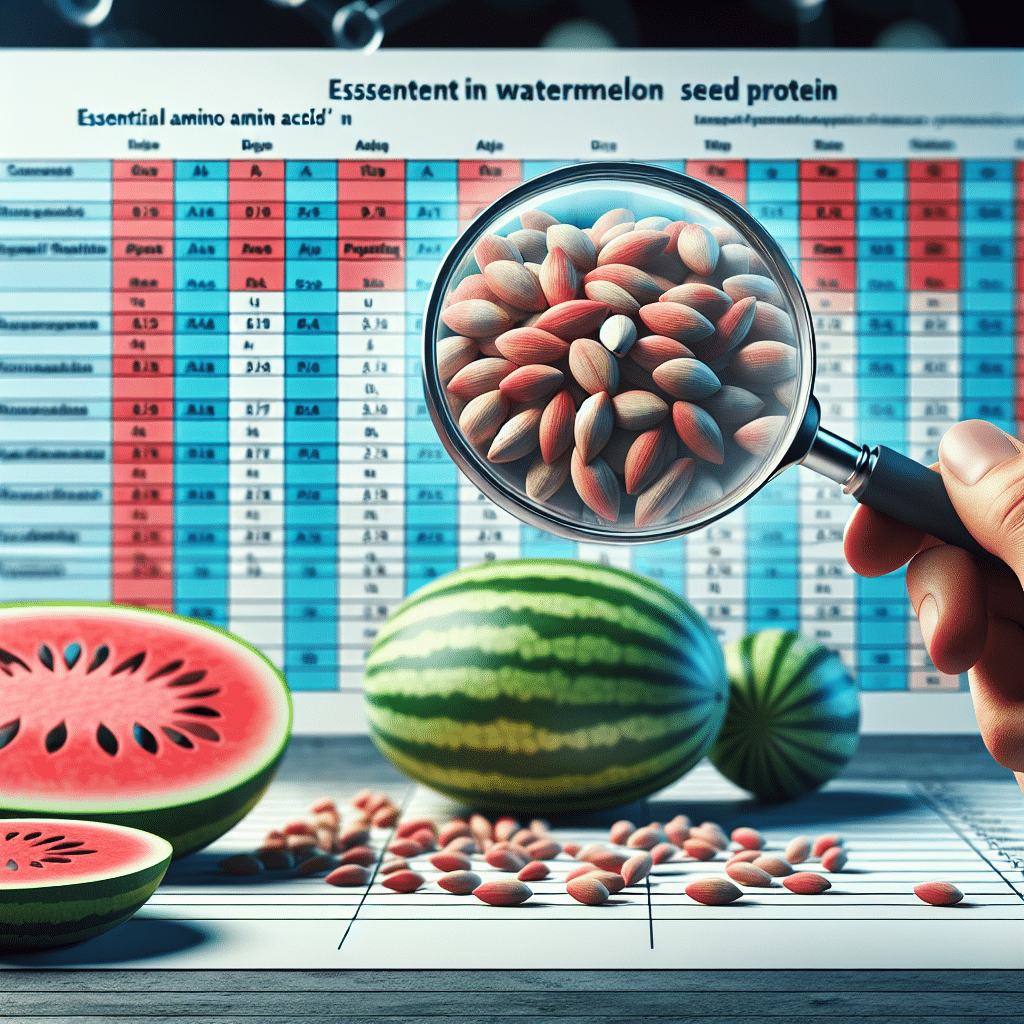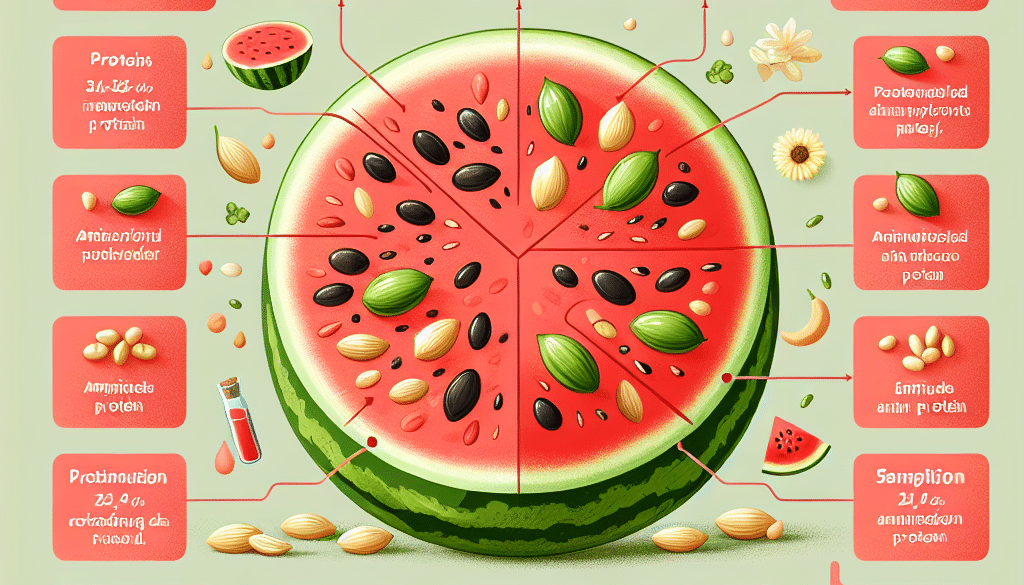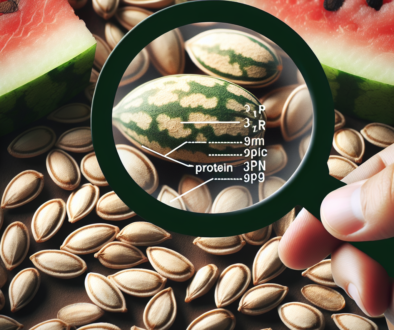Is Watermelon Seed Protein A Complete Protein?
-
Table of Contents
- Watermelon Seed Protein: Is It a Complete Source of Nutrition?
- Understanding Complete Proteins
- Watermelon Seed Protein: Nutritional Breakdown
- Is Watermelon Seed Protein a Complete Protein?
- Benefits of Watermelon Seed Protein
- Comparing Watermelon Seed Protein to Other Plant Proteins
- Incorporating Watermelon Seed Protein into Your Diet
- Conclusion: The Potential of Watermelon Seed Protein
- Discover ETprotein’s High-Quality Watermelon Seed Protein
Watermelon Seed Protein: Is It a Complete Source of Nutrition?

When it comes to plant-based proteins, there’s a growing interest in alternative sources that are sustainable, nutritious, and can cater to the dietary needs of a diverse population. Watermelon seed protein is one such source that has been gaining attention in the health and wellness community. But the question remains: Is watermelon seed protein a complete protein? This article delves into the nutritional profile of watermelon seed protein, its benefits, and its potential as a complete protein source.
Understanding Complete Proteins
Proteins are made up of amino acids, which are the building blocks of our muscles, enzymes, hormones, and other vital bodily functions. There are 20 different amino acids, and nine of these are considered essential because our bodies cannot produce them on their own. A complete protein is one that contains all nine essential amino acids in sufficient quantities.
Animal-based proteins, such as meat, dairy, and eggs, typically contain all essential amino acids, making them complete proteins. However, many plant-based proteins lack one or more essential amino acids, which is why they are often referred to as incomplete proteins.
Watermelon Seed Protein: Nutritional Breakdown
Watermelon seeds are more than just a byproduct of the juicy fruit we enjoy in the summer. They are a rich source of nutrients, including protein, vitamins, minerals, and healthy fats. When ground into a powder, watermelon seeds provide a concentrated source of protein that can be easily added to a variety of foods and beverages.
- High in Protein: Watermelon seed protein typically contains around 60% protein by weight.
- Rich in Nutrients: It is also a good source of magnesium, zinc, and healthy fats.
- Low in Calories: Watermelon seed protein is relatively low in calories, making it an attractive option for weight management.
Is Watermelon Seed Protein a Complete Protein?
Recent studies have shown that watermelon seed protein contains all nine essential amino acids, which is promising for its classification as a complete protein. However, the levels of certain amino acids, such as lysine and threonine, may be lower compared to other protein sources. This means that while watermelon seed protein is technically complete, it may not be the optimal sole source of protein for individuals with high protein requirements unless consumed in larger quantities or complemented with other protein sources.
Benefits of Watermelon Seed Protein
Aside from its protein content, watermelon seed protein offers several health benefits:
- Heart Health: The magnesium in watermelon seeds supports heart health and regulates blood pressure.
- Immune Support: Zinc plays a crucial role in immune function, and watermelon seeds are a good source of this mineral.
- Plant-Based: As a vegan protein source, it’s suitable for those following a plant-based diet.
- Gluten-Free: Watermelon seed protein is naturally gluten-free, making it a safe option for individuals with gluten sensitivities or celiac disease.
Comparing Watermelon Seed Protein to Other Plant Proteins
When compared to other plant-based proteins like pea, rice, or soy, watermelon seed protein holds its own in terms of nutritional value. Each of these proteins has its unique profile of amino acids, and some may be higher in certain essential amino acids than others. For example, pea protein is rich in lysine, while rice protein is lower in lysine but high in methionine. By combining different plant proteins, one can achieve a more balanced amino acid profile.
Incorporating Watermelon Seed Protein into Your Diet
Watermelon seed protein can be easily incorporated into your diet in various ways:
- Add it to smoothies or shakes for a protein boost.
- Use it in baking recipes as a partial flour substitute.
- Mix it into oatmeal or yogurt for a nutritious breakfast.
- Create homemade protein bars or energy balls.
Conclusion: The Potential of Watermelon Seed Protein
In conclusion, watermelon seed protein is a complete protein that offers a range of health benefits. While it may not be the highest in certain essential amino acids, it can still play a valuable role in a balanced diet, especially when combined with other protein sources. Its plant-based origin, nutrient density, and versatility make it an excellent option for those looking to diversify their protein intake.
Discover ETprotein’s High-Quality Watermelon Seed Protein
If you’re interested in exploring the benefits of watermelon seed protein, ETprotein offers a premium selection of plant-based protein products, including watermelon seed protein. Their products are characterized by a neutral taste, non-GMO, allergen-free attributes, and are suitable for a wide range of applications in the food and beverage industry.
ETprotein’s commitment to quality and customer satisfaction makes them a top choice for sourcing organic bulk vegan proteins. To learn more about their offerings or to sample their watermelon seed protein, contact ETprotein today.
About ETprotein:
ETprotein, a reputable protein and L-(+)-Ergothioneine (EGT) Chinese factory manufacturer and supplier, is renowned for producing, stocking, exporting, and delivering the highest quality organic bulk vegan proteins and L-(+)-Ergothioneine. They include Organic rice protein, clear rice protein, pea protein, clear pea protein, watermelon seed protein, pumpkin seed protein, sunflower seed protein, mung bean protein, peanut protein, and L-(+)-Ergothioneine EGT Pharmaceutical grade, L-(+)-Ergothioneine EGT food grade, L-(+)-Ergothioneine EGT cosmetic grade, L-(+)-Ergothioneine EGT reference grade and L-(+)-Ergothioneine EGT standard. Their offerings, characterized by a neutral taste, non-GMO, allergen-free attributes, with L-(+)-Ergothioneine purity over 98%, 99%, cater to a diverse range of industries. They serve nutraceutical, pharmaceutical, cosmeceutical, veterinary, as well as food and beverage finished product distributors, traders, and manufacturers across Europe, USA, Canada, Australia, Thailand, Japan, Korea, Brazil, and Chile, among others.
ETprotein specialization includes exporting and delivering tailor-made protein powder and finished nutritional supplements. Their extensive product range covers sectors like Food and Beverage, Sports Nutrition, Weight Management, Dietary Supplements, Health and Wellness Products, and Infant Formula, ensuring comprehensive solutions to meet all your protein needs.
As a trusted company by leading global food and beverage brands and Fortune 500 companies, ETprotein reinforces China’s reputation in the global arena. For more information or to sample their products, please contact them and email sales(at)ETprotein.com today.












